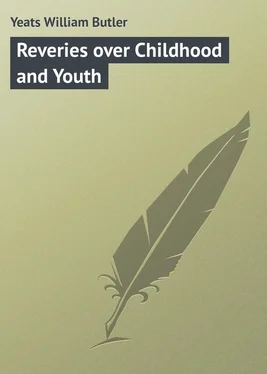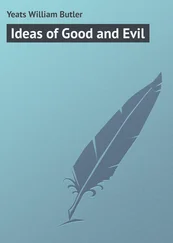William Yeats - Reveries over Childhood and Youth
Здесь есть возможность читать онлайн «William Yeats - Reveries over Childhood and Youth» — ознакомительный отрывок электронной книги совершенно бесплатно, а после прочтения отрывка купить полную версию. В некоторых случаях можно слушать аудио, скачать через торрент в формате fb2 и присутствует краткое содержание. Жанр: foreign_prose, на английском языке. Описание произведения, (предисловие) а так же отзывы посетителей доступны на портале библиотеки ЛибКат.
- Название:Reveries over Childhood and Youth
- Автор:
- Жанр:
- Год:неизвестен
- ISBN:нет данных
- Рейтинг книги:4 / 5. Голосов: 1
-
Избранное:Добавить в избранное
- Отзывы:
-
Ваша оценка:
- 80
- 1
- 2
- 3
- 4
- 5
Reveries over Childhood and Youth: краткое содержание, описание и аннотация
Предлагаем к чтению аннотацию, описание, краткое содержание или предисловие (зависит от того, что написал сам автор книги «Reveries over Childhood and Youth»). Если вы не нашли необходимую информацию о книге — напишите в комментариях, мы постараемся отыскать её.
Reveries over Childhood and Youth — читать онлайн ознакомительный отрывок
Ниже представлен текст книги, разбитый по страницам. Система сохранения места последней прочитанной страницы, позволяет с удобством читать онлайн бесплатно книгу «Reveries over Childhood and Youth», без необходимости каждый раз заново искать на чём Вы остановились. Поставьте закладку, и сможете в любой момент перейти на страницу, на которой закончили чтение.
Интервал:
Закладка:
Once every few months I used to go to Rosses Point or Ballisodare to see another little boy, who had a piebald pony that had once been in a circus and sometimes forgot where it was and went round and round. He was George Middleton, son of my great-uncle William Middleton. Old Middleton had bought land, then believed a safe investment, at Ballisodare and at Rosses, and spent the winter at Ballisodare and the summer at Rosses. The Middleton and Pollexfen flour mills were at Ballisodare, and a great salmon weir, rapids and a waterfall, but it was more often at Rosses that I saw my cousin. We rowed in the river mouth or were taken sailing in a heavy slow schooner yacht or in a big ship’s boat that had been rigged and decked. There were great cellars under the house, for it had been a smuggler’s house a hundred years before, and sometimes three loud raps would come upon the drawing room window at sun-down, setting all the dogs barking, some dead smuggler giving his accustomed signal. One night I heard them very distinctly and my cousins often heard them, and later on my sister. A pilot had told me that, after dreaming three times of a treasure buried in my uncle’s garden, he had climbed the wall in the middle of the night and begun to dig but grew disheartened “because there was so much earth.” I told somebody what he had said and was told that it was well he did not find it for it was guarded by a spirit that looked like a flat iron. At Ballisodare there was a cleft among the rocks that I passed with terror because I believed that a murderous monster lived there that made a buzzing sound like a bee.
It was through the Middletons perhaps that I got my interest in country stories and certainly the first faery stories that I heard were in the cottages about their houses. The Middletons took the nearest for friends and were always in and out of the cottages of pilots and of tenants. They were practical, always doing something with their hands, making boats, feeding chickens, and without ambition. One of them had designed a steamer many years before my birth and long after I had grown to manhood one could hear it – it had some sort of obsolete engine – many miles off wheezing in the Channel like an asthmatic person. It had been built on the lake and dragged through the town by many horses, stopping before the windows where my mother was learning her lessons, and plunging the whole school into candle-light for five days, and was still patched and repatched mainly because it was believed to be a bringer of good luck. It had been called after the betrothed of its builder “Janet,” long corrupted into the more familiar “Jennet,” and the betrothed died in my youth having passed her eightieth year and been her husband’s plague because of the violence of her temper. Another who was but a year or two older than myself used to shock me by running after hens to know by their feel if they were on the point of dropping an egg. They let their houses decay and the glass fall from the windows of their greenhouses, but one among them at any rate had the second sight. They were liked but had not the pride and reserve, the sense of decorum and order, the instinctive playing before themselves that belongs to those who strike the popular imagination.
Sometimes my grandmother would bring me to see some old Sligo gentlewoman whose garden ran down to the river, ending there in a low wall full of wallflowers, and I would sit up upon my chair, very bored, while my elders ate their seed-cake and drank their sherry. My walks with the servants were more interesting; sometimes we would pass a little fat girl and a servant persuaded me to write her a love-letter, and the next time she passed she put her tongue out. But it was the servant’s stories that interested me. At such and such a corner a man had got a shilling from a drill sergeant by standing in a barrel and had then rolled out of it and shown his crippled legs. And in such and such a house an old woman had hid herself under the bed of her guests, an officer and his wife, and on hearing them abuse her, beaten them with a broomstick. All the well-known families had their grotesque or tragic or romantic legends, and I often said to myself how terrible it would be to go away and die where nobody would know my story. Years afterwards, when I was ten or twelve years old and in London, I would remember Sligo with tears, and when I began to write, it was there I hoped to find my audience. Next to Merville where I lived, was another tree-surrounded house where I sometimes went to see a little boy who stayed there occasionally with his grandmother, whose name I forget and who seemed to me kind and friendly, though when I went to see her in my thirteenth or fourteenth year I discovered that she only cared for very little boys. When the visitors called I hid in the hay-loft and lay hidden behind the great heap of hay while a servant was calling my name in the yard.
I do not know how old I was (for all these events seem at the same distance) when I was made drunk. I had been out yachting with an uncle and my cousins and it had come on very rough. I had lain on deck between the mast and the bowsprit and a wave had burst over me and I had seen green water over my head. I was very proud and very wet. When we got into Rosses again, I was dressed up in an older boy’s clothes so that the trousers came down below my boots and a pilot gave me a little raw whiskey. I drove home with the uncle on an outside car and was so pleased with the strange state in which I found myself that for all my uncle could do, I cried to every passer-by that I was drunk, and went on crying it through the town and everywhere until I was put to bed by my grandmother and given something to drink that tasted of black currants and so fell asleep.
III
Some six miles off towards Ben Bulben and beyond the Channel, as we call the tidal river between Sligo and the Rosses, and on top of a hill there was a little square two-storeyed house covered with creepers and looking out upon a garden where the box borders were larger than any I had ever seen, and where I saw for the first time the crimson streak of the gladiolus and awaited its blossom with excitement. Under one gable a dark thicket of small trees made a shut-in mysterious place, where one played and believed that something was going to happen. My great-aunt Micky lived there. Micky was not her right name for she was Mary Yeats and her father had been my great-grandfather, John Yeats, who had been Rector of Drumcliffe, a few miles further off, and died in 1847. She was a spare, high-coloured, elderly woman and had the oldest looking cat I had ever seen, for its hair had grown into matted locks of yellowy white. She farmed and had one old man-servant, but could not have farmed at all, had not neighbouring farmers helped to gather in the crops, in return for the loan of her farm implements and “out of respect for the family,” for as Johnny MacGurk, the Sligo barber said to me, “the Yeats’s were always very respectable.” She was full of family history; all her dinner knives were pointed like daggers through much cleaning, and there was a little James the First cream-jug with the Yeats motto and crest, and on her dining-room mantle-piece a beautiful silver cup that had belonged to my great-great-grandfather, who had married a certain Mary Butler. It had upon it the Butler crest and had been already old at the date 1534, when the initials of some bride and bridegroom were engraved under the lip. All its history for generations was rolled up inside it upon a piece of paper yellow with age, until some caller took the paper to light his pipe. Another family of Yeats, a widow and her two children on whom I called sometimes with my grandmother, lived near in a long low cottage, and owned a very fierce turkeycock that did battle with their visitors; and some miles away lived the secretary to the Grand Jury and Land Agent, my great-uncle Mat Yeats and his big family of boys and girls; but I think it was only in later years that I came to know them well. I do not think any of these liked the Pollexfens, who were well off and seemed to them purse-proud, whereas they themselves had come down in the world. I remember them as very well-bred and very religious in the Evangelical way and thinking a good deal of Aunt Micky’s old histories. There had been among our ancestors a Kings County soldier, one of Marlborough’s generals, and when his nephew came to dine he gave him boiled pork, and when the nephew said he disliked boiled pork he had asked him to dine again and promised him something he would like better. However, he gave him boiled pork again and the nephew took the hint in silence. The other day as I was coming home from America, I met one of his descendants whose family has not another discoverable link with ours, and he too knew the boiled pork story and nothing else. We have the General’s portrait, and he looks very fine in his armour and his long curly wig, and underneath it, after his name, are many honours that have left no tradition among us. Were we country people, we could have summarised his life in a legend.
Читать дальшеИнтервал:
Закладка:
Похожие книги на «Reveries over Childhood and Youth»
Представляем Вашему вниманию похожие книги на «Reveries over Childhood and Youth» списком для выбора. Мы отобрали схожую по названию и смыслу литературу в надежде предоставить читателям больше вариантов отыскать новые, интересные, ещё непрочитанные произведения.
Обсуждение, отзывы о книге «Reveries over Childhood and Youth» и просто собственные мнения читателей. Оставьте ваши комментарии, напишите, что Вы думаете о произведении, его смысле или главных героях. Укажите что конкретно понравилось, а что нет, и почему Вы так считаете.












